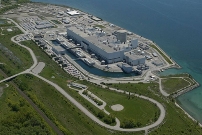Infrastructure Ontario has announced that it has extended the deadline for the final bid proposals for two new nuclear power reactors at Ontario Power Generation's (OPG's) existing Darlington site. Meanwhile, OPG has been told to cut operating costs at its existing regulated plants.
 |
| Darlington (Image: OPG) |
The extension "will allow respondents more time to assess appropriate risk sharing and pricing terms - and issues raised from requests for additional information - to ensure the provision of quality bids from vendors," said Infrastructure Ontario. It added, "It is expected that the preferred vendor will be announced this spring but timing will remain somewhat flexible to ensure the best deal for Ontario ratepayers."
The government of Ontario launched a two-phase competitive procurement process in March 2008 to select a preferred supplier of two nuclear reactors to be constructed in the province. A commercial team directed by Infrastructure Ontario is managing the procurement process. Team members include OPG, Bruce Power, the Ministry of Energy and the Ministry of Finance. A two-member decision review board will review the competitive process. The process will be scrutinized by a "fairness monitor."
The Ministry of Energy, OPG and Bruce Power have already carried out a review of available nuclear technologies and invited "four internationally recognized vendors" to participate in the first phase of the proposal process. The four vendors were Areva, Atomic Energy of Canada Ltd (AECL), GE-Hitachi Nuclear Energy and Westinghouse. However, in early April 2008 Infrastructure Ontario announced that GE-Hitachi had made a business decision to withdraw from the procurement process.
Infrastructure Ontario said that it is using an "innovative approach" by selecting a reactor vendor based on "pre-established commercial terms, including lifetime cost of power, ability to deliver on schedule and level of investment in Ontario." It noted that "this approach requires extensive discussion with vendors to ensure that bids are well informed and in the best interest of Ontarians."
The procurement project taking place is a component of a 20 year energy plan launched by the Ontario government in 2006. The plan calls for the 14,000 MWe of nuclear capacity in Ontario to be maintained, which will require new build to replace retiring facilities. In addition the plan calls for a reduction in demand of 6300 MWe, a doubling of the use of renewables (including hydro) to 15,700 MWe, an increase in gas-fired generation to handle peak demand and the elimination of coal-fired generation by 2014.
OPG told to cut costs
Meanwhile, the Ontario Energy Board (OEB) has released its decision regarding OPG's payment levels for the output of its regulated nuclear and hydroelectric generating plants. Six of government-owned OPG's hydroelectric plants and three nuclear power plants (Pickering A and B, plus Darlington) are regulated.
OPG had asked the OEB to approve a 14% increase to help close a projected C$1 billion ($0.8 billion) gap between the sale of electricity from its nuclear and hydroelectric plants and the expected higher cost of operating those facilities until the end of 2009. OPG's proposed revenue requirement up to the end of 2009 is about C$6.4 billion ($5.5 billion), but it says that if the current payment amounts were to stay in place its regulated facilities would generate only C$5.4 billion ($4.7 billion).
The OEB reviewed the cost proposals underlying OPG's application and has decided there should be reductions in a number of areas including: nuclear operating costs, the return on equity, the debt/equity ratio, the treatment of nuclear liabilities and the treatment of revenues from the Bruce nuclear power plant. The OEB estimated that OPG's revenue requirement until the end of 2009 will be approximately C$6.0 billion ($5.2 billion). The OEB has asked OPG to file revised payment amounts reflecting these changes.
The OEB rejected OPG's request rate increase and ruled that an 8.5% increase was more reasonable. It also denied OPG a request that 25% of its revenue be fixed regardless of how much electricity it produces, while the remaining 75% be tied to its output.




_47120.jpg)

_23621.jpg)






